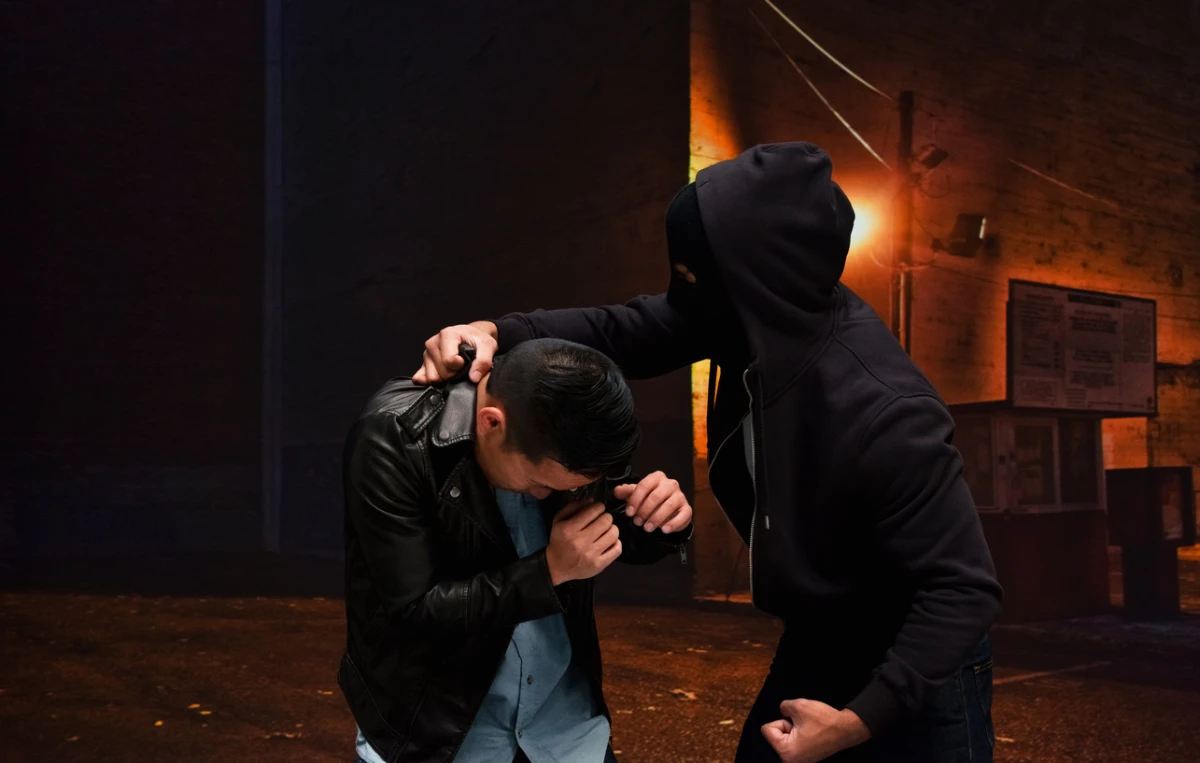
Assault charges in Illinois can vary widely in severity. A simple threat or act of intimidation might lead to a misdemeanor. At the same time, an incident involving a weapon or serious injury can result in felony charges, particularly if it results in physical harm. Understanding the difference between simple and aggravated assault charges is critical, especially if you are facing allegations.
At Kostopoulos Law Group, we represent individuals throughout Chicago in criminal cases involving assault and other violent offenses. This article explains how Illinois law distinguishes between simple and aggravated assault, what penalties may apply, and why legal representation by criminal defense attorneys is essential if you have been charged.
Simple Assault: Definition and Legal Implications
Under the law, a person commits simple assault when their behavior makes another person feel reasonable apprehension of immediate, unwanted physical contact. No punch has to land, and no weapon has to appear. A clenched fist swung inches from someone’s face, or words like “I’m about to smash you” can be enough.
Illinois treats simple assault, also known as misdemeanor assault, as a Class C misdemeanor. Possible penalties include:
- Up to 30 days in the county jail
- Fines as high as $1,500
- 30–120 hours of community service
Common real-world examples include shouting threats during a bar dispute, slamming a car door while vowing to “run you over,” or charging toward a neighbor with raised hands before friends pull you back. None of these cases involves serious injury or a weapon, nor do they lead to serious bodily harm, yet the fear felt by the target fulfills the statute.
Aggravated Assault: What Elevates the Charge
The same threatening act can turn into aggravated assault once certain “aggravating factors” enter the picture. Illinois lists these factors in and they all increase potential harm or heighten public concern.
Aggravating Factors in Illinois
The following circumstances raise a simple assault to an aggravated assault:
- Use of a deadly weapon or even a realistic imitation
- Targeting protected individuals such as police officers, firefighters, teachers, senior citizens, or public aid workers
- Conduct taking place on public property, school grounds, park district land, or public transportation
- Intent to cause serious bodily injury, disfigurement, or permanent disability
- Discharging a firearm in the victim’s direction
- Wearing a hood or mask to hide identity during the assault
Depending on which factor applies, aggravated assault may be charged as:
- Class A misdemeanor, punishable by up to one year in jail and fines up to $2,500, or
- Class 4 felony, carrying one to three years in the Illinois Department of Corrections and fines up to $25,000
Even a first-time offender can face a felony if, for example, the alleged victim is a police officer or a gun is displayed. The difference in long-term impact between a misdemeanor and a felony, including potential years in prison, makes understanding these factors vital.
Assault vs. Battery: Clearing Up Common Confusion
People often use “assault and battery” as if it were one crime, yet Illinois treats them as separate offenses. Assault focuses on the threat itself; battery addresses the physical contact that follows. Think of assault as the raised fist and battery as the swing that lands.
An incident might involve only assault, only battery, or both. For instance, if you point a knife at someone and walk away, the charge is assault. If you stab, it becomes a battery. If you first wave the knife and then cut, prosecutors can file both charges.
Both offenses fall under Article 12 of the Illinois Criminal Code, but they carry different penalty ranges. That distinction matters when plea discussions or sentencing hearings begin.
Consequences of an Assault Charge in Chicago
A single misdemeanor may feel minor, yet any conviction places a mark on your criminal history, which can result in a permanent criminal record. Employers, landlords, and licensing boards often see the record before hearing your side of the story. Felony convictions add mandatory DNA sampling, firearm bans, and the risk of longer prison terms for future offenses.
Sentencing will hinge on charge level, prior record, and whether the victim suffered harm. Judges can order probation, anger-management classes, or diversion programs for first-time misdemeanor defendants. Felony cases, especially those involving weapons or protected persons, usually bring tougher terms.
Beyond court sanctions, immigration status, professional licensing, and even child custody arrangements can be affected. Knowing these ripple effects early helps you plan a defense that looks past the next court date.
Legal Defense Strategies for Assault Charges
Every case has its facts, yet several defenses come up again and again. A skilled criminal assault lawyer will weigh the evidence and choose the approach that best fits the circumstances.
Common Legal Defenses
- Self-defense. You believed force was necessary to protect yourself from imminent harm.
- Defense of others. Your actions aimed to shield another person from immediate danger.
- Lack of intent. The gesture or words were misread, and you never meant to threaten anyone.
- False accusation or mistaken identity. Witnesses could not clearly see the assailant, and personal motives led to a fabricated claim.
Evidence drives these defenses. Cell-phone videos, surveillance footage, 911 recordings, medical reports, and impartial witness statements can confirm or contradict the narrative in the police report. An attorney’s job is to locate, preserve, and present that material before memories fade or footage gets erased.
In some situations, negotiations may lead to reduced charges, deferred prosecution, or dismissal. A well-documented defense package often strengthens the bargaining position.
Comparison Table: Simple vs. Aggravated Assault in Illinois
| Feature | Simple Assault | Aggravated Assault |
| Statute | 720 ILCS 5/12-1 | 720 ILCS 5/12-2 |
| Charge Level | Class C misdemeanor | Class A misdemeanor or Class 4 felony |
| Penalty Range | Up to 30 days in jail, $1,500 fine | Up to 1 year in jail or 1–3 years in prison, fines up to $25,000 |
| Common Factors | No weapon, no serious injury | Weapon, protected victim, special location, intent for grave harm |
| Community Service | 30–120 hours | Possible, but often replaced by jail or prison time |
The table highlights how a single added element, such as a weapon or a school setting, can raise both charge class and potential punishment.
When to Contact a Criminal Defense Lawyer
The first hours after an arrest set the stage for the rest of the case. Statements to police, consent to searches, and missed evidence can all shape the outcome. By reaching out to counsel immediately, you give yourself protection during questioning and a head start on building a defense.
Assault law looks simple on the surface, yet the fine print on aggravating factors and sentencing ranges can trip up anyone unfamiliar with Illinois procedure. A criminal defense attorney can scrutinize police reports, interview witnesses, and push back against shaky claims. Early intervention also opens the door to diversion programs or mental-health referrals that may keep a conviction off your record.
If you or someone you love faces an assault allegation, If you or someone you love faces an assault allegation, prompt legal advice, as well as understanding legal justification, often makes a measurable difference.
Need Legal Assistance? Contact Kostopoulos Law Group
We stand with people across Chicago and the suburbs who find themselves up against threatening allegations. Drawing on more than 20 years of courtroom work, our team crafts defenses aimed at protecting freedom, jobs, and reputations. Call us at 630-283-8024 or visit our Contact Us page to arrange a confidential consultation. The sooner we talk, the sooner we can start safeguarding your rights.





